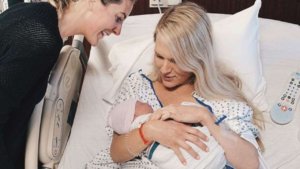Hollie Hepler is now 31 but vividly remembers the day, at age 16, she was told she would never be able to carry a child or give birth.
“I was sitting in the room with my mom and a nurse came in, and she was shaking and said, ‘Honey, I’m so sorry,'” recalled Hepler, who was diagnosed with Mayer-Rokitansky-Küster-Hauser (MRKH) syndrome , a disorder that causes the vagina and uterus to be underdeveloped or absent.
In Hepler’s case, though she was born without a uterus, she was told by doctors she was otherwise fine medically, including having fully-functioning ovaries.
“The diagnosis spiraled me into a decade, probably, of fear and insecurity and just having to let go and have faith,” she said. “I wasn’t even thinking about being a mom at that time, but I always knew I wanted children.”
When Hepler met her husband, Joe, in her 20s, she told him early on in their relationship about her inability to carry a child.
“His exact words were, ‘You’re going to have to do and say a lot more to get rid of me,'” Hepler recalled.
The couple wed in 2014, and it was Joe who proved to be her link to motherhood in an unlikely way.
Just one year after they wed, Joe Hepler’s younger sister, PJ Willis, drove to the couple’s South Florida home and told her brother and sister-in-law that she wanted to carry their child.
“Before I had children, when I found out that Hollie couldn’t have children, in my mind, I thought, ‘Oh I could do that for her,'” said Willis, now 28. “When it came to be a real possibility, I was in a season of my life of trying to figure out my future.”
“I had just gotten married and had time to self-reflect, and I thought it was time to start having our children so we could have theirs later,” she said.



